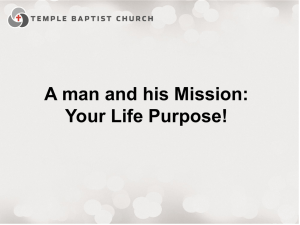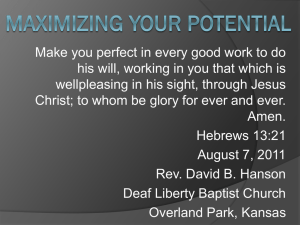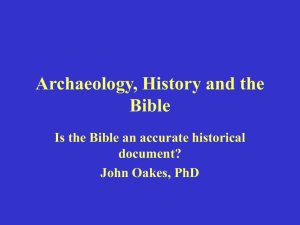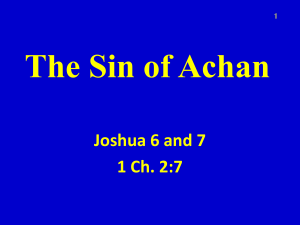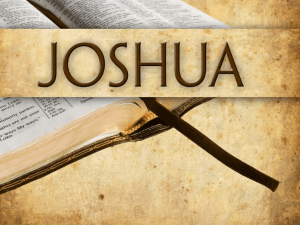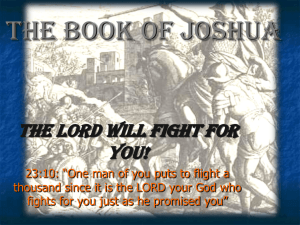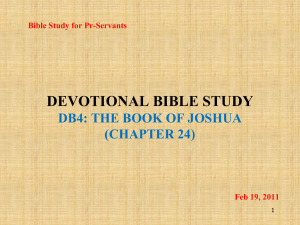Book of Joshua PowerPoint Chapter 7
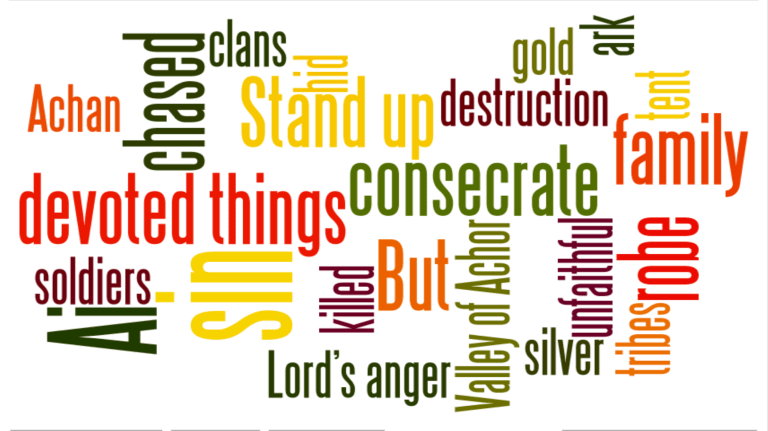
Chapter 7
Faithful God & Unfaithful People
Bethany Covenant Church
Fall 2014
PowerPoint Access Online
www.bccmv.org/book-of-joshua
Bethany Homepage/media/resources/Book of Joshua www.Microsoft.com
for free PowerPoint viewer
Quick Review
• God instructed Israel before Jericho was invaded: “But keep away from the devoted things, so that you will not bring about your own destruction by taking any of them. Otherwise you will make the camp of Israel liable to destruction and bring trouble on it. All the silver and gold and the articles of bronze and iron are sacred to the L ORD and
must go into his treasury.”” (Joshua 6:18–19, NIV)
Quick Review
• Seven priests blowing seven trumpets walked seven times around
Jericho on the seventh day.
• The last verse of chapter 6: “So the L ORD was with Joshua, and his fame spread throughout the land.” (Joshua 6:27, NIV)
• God told Moses: “But the land that you are going over to possess is a land of hills and valleys,” (Deuteronomy 11:11, ESV)
“But the Israelites were unfaithful in regard to the devoted things;
Achan son of Karmi, the son of Zimri, the son of Zerah, of the tribe of
Judah, took some of them. So the L ORD ’s anger burned against Israel.”
•
• “But” is a warning of things to come that are
• Lord was with Joshua, and his fame was in all the land.”
•
(Joshua 6:27)
Even Joshua’s name and fame could not save Israel whole batch of dough?” (1 Corinthians 5:6, NIV)
“Now Joshua sent men from Jericho to Ai, which is near Beth Aven to the east of Bethel, and told them, “Go up and spy out the region.”
So the men went up and spied out Ai.” (Joshua 7:2, NIV)
Who told Joshua to spy out or invade Ai?
This is territory
Abram visited in
Genesis
“From there [Abram] went on toward the hills east of Bethel and pitched his tent, with Bethel on the west and Ai on the east. There he built an altar to the LORD and called on the name of the LORD .” (Genesis 12:8)
“When they returned to Joshua, they said,
“Not all the army will have to go up against Ai.
Send two or three thousand men to take it and do not weary the whole army, for only a few people live there.” (Joshua 7:3, NIV)
• “And they said to Joshua, “Truly the
L ORD has given all the land into our
• hands. And also, all the inhabitants of
• In spying on Jericho the report back to
Joshua were the facts, not the conclusion. In spying on Ai they provide the facts and conclusion on military strategy.
• The spies make no mention of the Lord; they are full of selfconfidence not Godconfidence.
“So about three thousand went up; but they were routed by the men of Ai, who killed about thirty-six of them. They chased the
Israelites from the city gate as far as the stone quarries and struck them down on the slopes.
At this the hearts of the people melted in fear and became like water.” (Joshua 7:4–5, NIV)
Ai is uphill from Jericho.
The soldiers marched confidently uphill and ran in fear back down.
Joshua did not go with the
3,000 soldiers to Ai and likely considered that his mistake.
Joshua The Discouraged
• Remorse (7:6)
• Reproach (7:7-9)
• Repentance (7:8-9)
• Rebuke (7:10-15)
“Then Joshua tore his clothes and fell facedown to the ground before the ark of the L ORD , remaining there till evening. The elders of Israel did the same, and sprinkled dust on their heads.”
(Joshua 7:6, NIV)
• The leader who was magnified is now mortified.
• Had Joshua humbled himself before the battle, things would have been different after the battle.
• The ark of the covenant was left in camp because the proud soldiers believed they could now handle things on their own.
“And Joshua said, “Alas, Sovereign L ORD , why did you ever bring this people across the Jordan to deliver us into the hands of the Amorites to destroy us? If only we had been content to stay on the other side of the Jordan! (Joshua 7:7, NIV)
• Joshua seems to be reproaching God. Recall that God removed the “reproach of Egypt” (Joshua 5:9) from Israel, but Joshua seems to forget.
• Unbelief will always settle for something less than God’s best.
“Pardon your servant, Lord. What can I say, now that Israel has been routed by its enemies? The Canaanites and the other people of the country will hear about this and they will surround us and wipe out our name from the earth. What then will you do for your
Joshua the soldier is now servant mentions Israel’s name and then
God’s great name.
“The L ORD said to Joshua, “Stand up! What are you doing down on your face? Israel has sinned; they have violated my covenant, which I commanded them to keep. They have taken some of the devoted things; they have stolen, they have lied, they have put them with their own possessions.” (Joshua 7:10–11, NIV)
• The word “stand” is used 3 times in the next 3 verses.
• Stolen because they were things to be given as first fruits to the Lord.
• Lied, because there was now a cover up and the things were hidden.
“That is why the Israelites cannot stand against their enemies; they turn their backs and run because they have been made liable to destruction. I will not be with you anymore unless you destroy whatever among you is devoted to destruction. “Go, consecrate the people. Tell them, ‘Consecrate yourselves in preparation for tomorrow; for this is what the
L ORD , the God of Israel, says: There are devoted things among you, Israel. You cannot stand against your enemies until you remove them.”
(Joshua 7:12–13, NIV) nation.
Warning:
Repent now!
For tomorrow judgment arrives!
““When anyone is unfaithful to the L ORD by sinning unintentionally in regard to any of the L ORD ’s holy things, they are to bring to the L ORD as a penalty a ram from the flock, one without defect and of the proper value in silver, according to the sanctuary shekel. It is a guilt offering. They must make restitution for what they have failed to do in regard to the holy things, pay an additional penalty of a fifth of its value and give it all to the priest. The priest will make atonement for them with the ram as a guilt offering, and they will be forgiven.” (Leviticus 5:15–16, NIV)
““ ‘In the morning, present yourselves tribe by tribe. The tribe the L ORD chooses shall come forward clan by clan; the clan the L ORD chooses shall come forward family by family; and the family the L ORD chooses shall come forward man by man.’ ”” (Joshua 7:14, NIV)
Closer look at verse 14
“In the morning therefore you shall be brought near by your tribes. And the tribe that the L ORD takes by lot shall come near by clans. And the clan that the L ORD
“In the morning, present yourselves tribe by tribe. The tribe the L ORD chooses shall come forward clan by clan; the clan the
L ORD chooses shall come forward takes shall come near by households. And the household family by family; and the family the L ORD chooses shall come that the L
ESV )
ORD takes shall come near man by man.” (Joshua 7:14, forward man by man.” (Joshua
7:14, NIV )
More about
Can you think of another time in scripture where lots were cast?
casting lots
Casting Lots in Scripture
Proverbs
• “The lot is cast into the lap, but its every decision is from the
L ORD .” (Proverbs 16:33, ESV)
• “Casting the lot settles disputes and keeps strong opponents apart.” (Proverbs 18:18, NIV)
Other OT references
• “Then Saul said, “Cast the lot between me and my son
Jonathan.” And Jonathan was taken.” (1 Samuel 14:42, ESV)
• “He is to cast lots for the two goats—one lot for the L ORD and the other for the scapegoat.” (Leviticus
16:8, NIV)
• “Their inheritance was by lot, just as the L ORD had commanded by the hand of Moses for the nine and one-half tribes.” (Joshua 14:2, ESV)
Casting Lots in Scripture
New Testament
• “Once when Zechariah’s division was on duty and he was serving as priest before God, he was chosen by lot, according to the custom of the priesthood, to go into the temple of the Lord and burn incense.” (Luke 1:8–9, NIV)
• “And they cast lots for them, and the lot fell on Matthias, and he was numbered with the eleven apostles.” (Acts 1:26, ESV)
• “And when they had crucified him, they divided his garments among them by casting lots.”
(Matthew 27:35, ESV)
Casting Lots in Scripture
• Never done to predict the future. It is not divination, fortune telling, horoscope or mysticism.
• It was a selection process; luck of the draw.
• No record in scripture of casting lots after Pentecost.
Back to
Joshua
“Whoever is caught with the devoted things shall be destroyed by fire, along with all that belongs to him. He has violated the covenant of the L ORD and has done an outrageous thing in Israel!’ ”” this announcement, if the devoted things were in your tent?
“Early the next morning Joshua had
Israel come forward by tribes, and
Judah was chosen. The clans of
Judah came forward, and the
Zerahites were chosen. He had the clan of the Zerahites come forward by families, and Zimri was chosen.
Joshua had his family come forward man by man, and Achan son of
Karmi, the son of Zimri, the son of
Zerah, of the tribe of Judah, was chosen.” (Joshua 7:16–18, NIV)
Jewish tradition says when Judah was chosen all the men of the tribe drew their swords as a symbol of their outrage.
“Then Joshua said to Achan, “My son, give glory to the L ORD , the God of Israel, and honor him. Tell me what you have done; do not hide it from me.” Achan replied, “It is true! I have sinned against the L ORD , the God of Israel. This is what I have done: When I saw in the plunder a beautiful robe from Babylonia, two hundred shekels of silver and a bar of gold weighing fifty shekels, I coveted them and took them. They are hidden in the ground inside my tent, with the silver underneath.””
(Joshua 7:19–21, NIV)
This was administration of an oath: “Give glory to the Lord.”
Back to the Garden:
Saw, beautiful, coveted, hidden
Achan and Eve
Achan in Jericho Eve in Garden of Eden
I saw in the plunder a beautiful robe . . . , I coveted them and
took them. They are hidden in the ground (Joshua 7)
The woman saw . . . and pleasing to the eye, . . . , she took some and ate it. . . gave some to her husband . . . , and they hid from the L ORD God among the trees of the garden.” (Genesis 3)
“So Joshua sent messengers, and they ran to the tent, and there it was, hidden in his tent, with the silver underneath. They took the things from the tent, brought them to Joshua and all the Israelites and spread them out before the L ORD .” (Joshua
7:22–23, NIV)
Achan’s confession alone was not enough, Joshua wanted the evidence:
1) Confirmed the lot selection process;
2) Confirmed the confession;
3) Assured removal of the devoted things from the midst of Israel.
“Then Joshua, together with all Israel, took Achan son of Zerah, the silver, the robe, the gold bar, his sons and daughters, his cattle, donkeys and sheep, his tent and all that he had, to the Valley of Achor. Joshua said, “Why have you brought this trouble on us?
The L ORD will bring trouble on you today.” (Joshua 7:24–25a, NIV)
It is the Lord, not Joshua, who pronounced judgment and sentence on Achan.
• No mention of a wife.
“Then all Israel stoned him, and after they had stoned the rest, they burned them. Over Achan they heaped up a large pile of rocks, which remains to this day. Then the L ORD turned from his fierce anger. Therefore that place has been called the Valley of Achor ever since.” (Joshua
• Israel went from the hill at Ai down to the valley of trouble.
• This is the 2 nd time Israel has heaped stones:
First to mark faith and victory, this one to bury sin and loss.
Who was killed that day?
“Then all Israel stoned him, and after they had stoned the rest, they burned them. Over Achan they heaped up a large pile of rocks, which remains to this day.” (Joshua 7:25b–26a, NIV)
“Parents are not to be put to death for their children, nor children put to death for their parents; each will die for their own sin.”
(Deuteronomy 24:16, NIV)
Who was killed at Achor?
• Most commentators believe the entire family was stoned, together with all possessions.
• But, the law says children are not put to death for their parents.
Look at the evidence
Who was killed at Achor?
• The text makes no mention of a wife, just children
• Joshua says to Achan “Why have you brought this trouble on us? The
L ORD will bring trouble on you today.” (Joshua 7:24–25a, NIV)
• Achan says “I sinned against the Lord,” he does not implicate his family or others
• The text in most versions says “all Israel stoned him ,” not them
• God specifically says to Joshua “Achan . . . , took some of [the devoted things].” (Joshua 7:1, NIV)
• The text says “Over Achan they heaped up a large pile of rocks, which remains to this day.” (Joshua 7:26, NIV)
Chiasmus in Joshua 7
A The anger of the Lord burned against Israel (7:1)
B Israel’s soldiers killed by Ai’s soldiers (7:2-5)
C Joshua asking the cause of defeat before the Lord (7:6-9)
D I will not be with you unless you destroy devoted things (7:12)
C’ Joshua searching for person who caused the wrath of the Lord (7:16-21)
B’ Achan killed by all Israel (7:22-25)
A’ The anger of the Lord relented (7:26)
“What is it?” = Manna
(Exodus 16:15)
“When the dew was gone, thin flakes like frost on the ground appeared on the desert floor. When the Israelites saw it, they said to each other, “What is it?” For they did not know what it was. Moses said to them, “It is the bread the L ORD has given you to eat.” (Exodus
16:14–15, NIV)
“The people of Israel called the bread manna. It was white like coriander seed and tasted like wafers made with honey.”
(Exodus 16:31, NIV)
“Jesus said to them, “Very truly I tell you, it is not Moses who has given you the bread from heaven, but it is my Father who gives you the true bread from heaven. For the bread of God is the bread that comes down from heaven and gives life to the world.” “Sir,” they said, “always give us this bread.” Then Jesus declared, “I am the bread of life. Whoever comes to me will never go hungry, and whoever believes in me will never be thirsty.
” (John 6:32–35, NIV)
“ Whoever has ears, let them hear what the Spirit says to the churches. To the one who is victorious, I will give some of the hidden manna.
” (Revelation 2:17a, NIV)
“ I am the bread of life. Your ancestors ate the manna in the wilderness, yet they died. But here is the bread that comes down from heaven, which anyone may eat and not die. I am the living bread that came down from heaven. Whoever eats this bread will live forever.
This bread is my flesh, which I will give for the life of the world.” ” (John
6:48–51, NIV)
“ This is the bread that came down from heaven. Your ancestors ate manna and died, but whoever feeds on this bread will live forever.” ”
(John 6:58, NIV)
Jesus and Manna
• Jesus is the “true bread” from heaven.
• He is “the bread of God” from heaven.
• Jesus is the “the bread of life.”
• Those who eat the bread from Christ “will live forever.”
• Manna was bread for only the Israelites, but Christ is the bread of life for the entire world.
• There was manna enough for all Israel; in Christ the true bread there is grace enough for entire world.
• Israel was hungry the next day after eating manna; in Christ the true bread the believer will never hunger.
Chiasmus in Joshua 2:1-7:26
A Rahab because of faith become Israelite, delivered from destruction (2:1-24)
B 3 days preparation at Jordan + 4 days healing from circumcision (3:1-5:9)
C Passover remembrance, first born death (5:10-11)
D Manna stopped (5:12a)
E Commander of the Lord’s army appears (5:13)
D’ Manna no longer received, Israelites ate fruit of the land (5:12b)
C’ Lord delivers first city to the Israelites, keeps first fruits (6:5)
B’ 7 days of encircling the city of Jericho (6:6-27)
A’ Achan because lack of faith treated as Canaanite, put to destruction (7:26)
Bibliography
• Be Strong, Wiersbe, Warren W., Be Commentary Series.
• The Bible Knowledge Commentary, Campbell, Donald K.
• Opening Up Joshua, Ellsworth, Roger, Opening Up Commentary.
• Matthew Henrys Commentary on the Whole Bible: Henry, Matthew.
• Warren W. Wiersbe’s Expository Outlines on the Old Testament
Wiersbe, Warren, W.
• Commentary on the Book of Joshua, Calvin, John, and Henry
Beveridge.
• The Teachers Bible Commentary, Philbeck, Ben F.
• The Books of History, Smith, James E., Old Testament Survey Series.
• Joshua’s Spiritual Warfare, Clarke, Thomas B.

